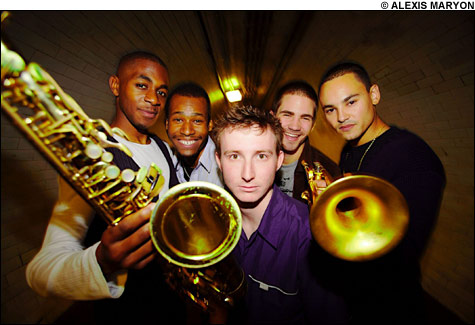
PICTORIAL: Movies and visual imagery inspire Empirical as much as does music. |
Talking with Nathaniel Facey, the 25-year-old alto-saxophonist in the London band Empirical, you find it difficult at first to pin down where and how the quintet (who play the Newport Jazz Festival August 10) developed their unusual compositional style. Some tunes have a straight-ahead post-bop feel, like Facey’s “Blessing”; with its standard song form mixed up with contrary keys and rhythms, it’s bright and hooky, like a cross between Ornette Coleman’s “Blues Connotation” and Miles Davis’s take on “Freedom Jazz Dance.” Other numbers, like Facey’s “Palantir” and pianist Kit Downes’s “Dark Lady,” are episodic marvels, one theme supplanted by another, each solo with its own background setting in the shifting textures of the piece. Although all five players in Empirical impress, it’s the writing that impresses most on their homonymous debut — the piquant ensemble voicings, the unfolding narrative structures.
Over the phone from London, Facey names an array of influences: Wayne Shorter (“particularly his current quartet”), Steve Coleman, Tim Berne. All of these offer keys to the band’s individual playing, even particular rhythmic or harmonic devices. But they don’t explain “Palantir,” whose 16-minute length is more the result of detailed writing than any extended solo passages.
“I think it’s a lot of things,” says Facey. “But we’re all fans of films and visual arts. For myself, I really love films and animation, as well as the dramatic nature of film music. That’s something that’s an inspiration: the more creative scores and really nice films. The music of The Lord of the Rings [Howard Shore] is really great, Pan’s Labyrinth [Javier Navarrete] as well. So there’s definitely the pictorial thing, as well as trying to conjure imagery or play in a really dramatic way.”
“Palantir” was inspired in part by “the mystical seeing stone” of that name from The Lord of the Rings. (Facey says he was watching the DVDs of the movie during the piece’s gestation.) Drummer Shaney Forbes’s “Kite” conjures the flight of a hawk over the Tuscan town of Vinci; it’s dedicated to Leonardo. Phelps’s lovely ballad “Clapton Willow” is about a district in Northeast London (not the guitar god) and a willow tree that lends a sense of calm to the troubled neighborhood.
Empirical is a cooperative venture — and it sounds like one. Here’s the ensemble balance and attention to tone and detail that Wynton Marsalis began to reintroduce into jazz beginning with 1988’s The Majesty of the Blues combined with the blurred mix of through-composition and improvisation that were a hallmark of Andrew Hill (another band hero). Facey and Jay Phelps are capable of ripping through the theme of Downes’s up-tempo “Fat Cat” in the kind of bebop unison sax/trumpet pairing that’s been standard since Bird and Diz. But just as often, the writing places them in carefully poised voicings — the hop-scotching counterlines of “Palantir” and especially “Dark Lady.”
Like many of Empirical’s tunes, “Dark Lady” is eventful. After an impressionist piano intro, alto and piano state the ballad-tempo theme, then trumpet cuts into this slow dance, joining the piano on the melody while the sax stalks them in close harmony. A fast pattering drum-and-cymbal figure slides in beneath the slow dance, and before long the piano drops out and Facey is tearing off an agitated solo over fast-running bass (Neil Charles) and drums. The trumpet returns, playing the slow theme beneath the turmoil, then the piano joins with spare chords. There’s a break for the slow dance again, and a final free fanfare. Downes says in the liner notes that Ornette Coleman (specifically “Lonely Woman”) was an inspiration for the piece, and in that final fanfare, Facey offers a musical quote from the great man.
That only hints at the variety of rewards to be had on Empirical. Phelps has a dark, rounded tone, a bit like Miles Davis, especially in the lower registers. On his forward-thrusting “A Tyrant’s Tale,” following a Facey alto solo, everything slows down for a trumpet soliloquy over a tolling every-other-bar bass note and shimmery piano. Phelps fires off stabbing figures and muttering trills and rolls the notes around in his mouth as the arrangement comes to a boil behind him. (The piece is a post-9/11 meditation.) There’s also a cover of Ali Farka Toure’s “Tulumba,” with album producer Courtney Pine on bass clarinet. And the four opening notes of “Clapton Willow” recall “Blue Monk,” Charles’s bowed solo setting up a Mingus-like release into the ensemble.
Too much composition, and there’s no jazz. But Empirical offer another example of how writing can be used to avoid the standard 32-bar and 12-bar blues cycling of chord changes, one soloist after another. It’s an orchestral way to think about the small band — something you can hear in the groups of Kurt Rosenwinkel and Dave Douglas, or in Brian Blade’s Fellowship Band (another group scheduled for Newport). Steve Lacy used to say that Monk wrote interesting, hard tunes as a way to seduce his band into rehearsing. It’s also a way to seduce listeners.